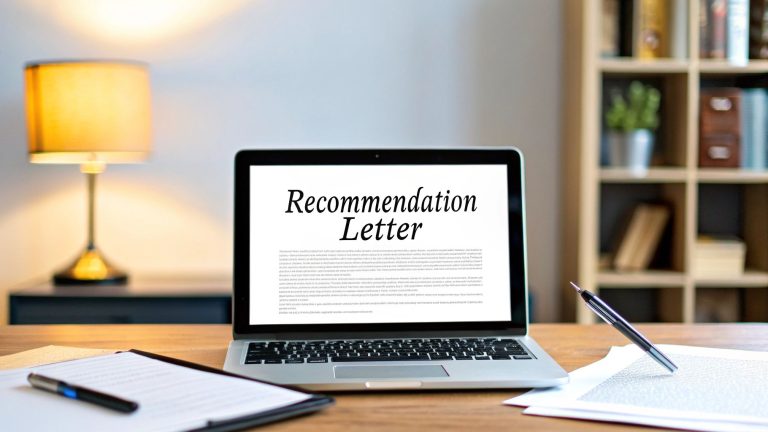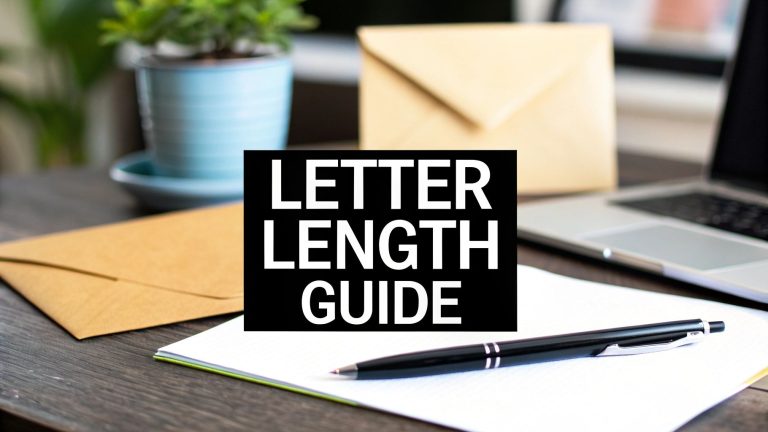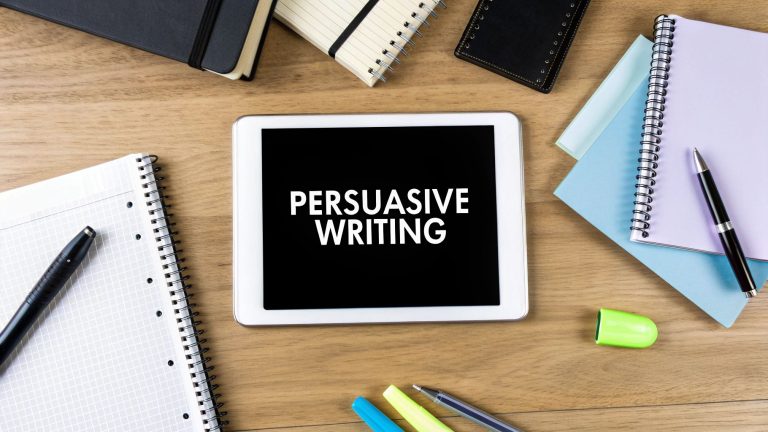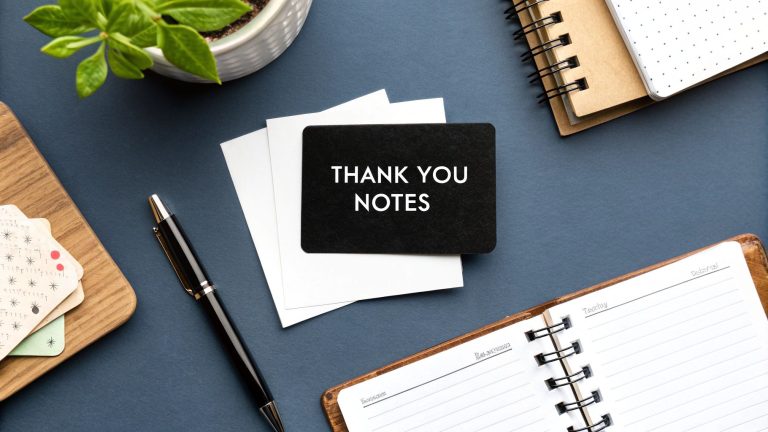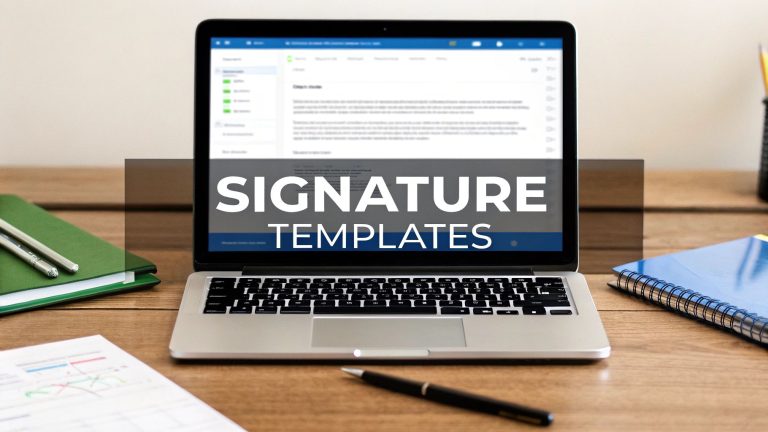When you agree to write an academic reference letter, you're doing more than just checking a box on a student's application. You're offering a story—a specific, evidence-backed narrative that brings their abilities to life. A truly great letter doesn't just support a candidate; it champions them.
Why a Great Reference Letter Is Non-Negotiable
Think of it this way: grades and test scores are just black-and-white photos of a student's academic journey. Your letter is the color commentary. It provides the crucial context that an admissions committee craves, answering the questions a resume simply can't.
What is this person really like in a discussion? How do they tackle a tough problem when the answer isn't obvious? What gets them genuinely excited about a subject?

This kind of endorsement is especially powerful for anyone aiming for the Education career cluster, where personal qualities are just as important as academic achievements.
The Anatomy of a Standout Reference Letter
Here's a quick look at the essential elements that transform a good reference letter into a great one, giving you a clear roadmap for the rest of this guide.
| Component | What It Achieves |
|---|---|
| Specific Examples | Moves beyond vague praise ("good student") to concrete evidence ("led a group project that earned the highest mark"). |
| Personal Connection | Shows you know the student well, adding weight and credibility to your endorsement. |
| Enthusiastic Tone | Conveys genuine belief in the candidate’s potential, making your recommendation more compelling. |
| Contextual Details | Explains why a particular skill or achievement is impressive (e.g., the difficulty of the course). |
These components work together to build a powerful case for the applicant.
The Decisive Impact of Your Endorsement
Your perspective is the secret weapon that helps admissions officers tell seemingly identical candidates apart. A thoughtful, detailed letter turns an applicant from a name and a GPA into a real, memorable person with unique potential.
It’s your chance to put a spotlight on the qualities that matter most:
- Resilience: Tell the story of how they bounced back from a setback on a difficult project.
- Intellectual Curiosity: Describe that time they stayed after class to debate a concept or pursued an idea far beyond the syllabus.
- Leadership Potential: Recall when they stepped up to guide a struggling group or took the initiative on a new idea.
Don't underestimate the power of a personal seal of approval. While the data often focuses on job applications, one study found that including a reference letter boosted employer callbacks by around 60%. That’s a massive difference, and it underscores just how much a trusted voice can sway a decision-maker.
Gathering Your Materials Before You Write
Jumping straight into writing a reference letter without the right information is a surefire way to produce something generic and, frankly, unhelpful. A truly powerful recommendation is built on a foundation of specific details, and the best source for those details is the student themselves.
Before you even think about opening a blank document, ask the student to pull together a "recommender's packet." This isn't just about making your life easier; it's about making sure your letter is accurate, personalized, and makes a real impact. Your goal is to move beyond vague praise and ground your endorsement in solid evidence.
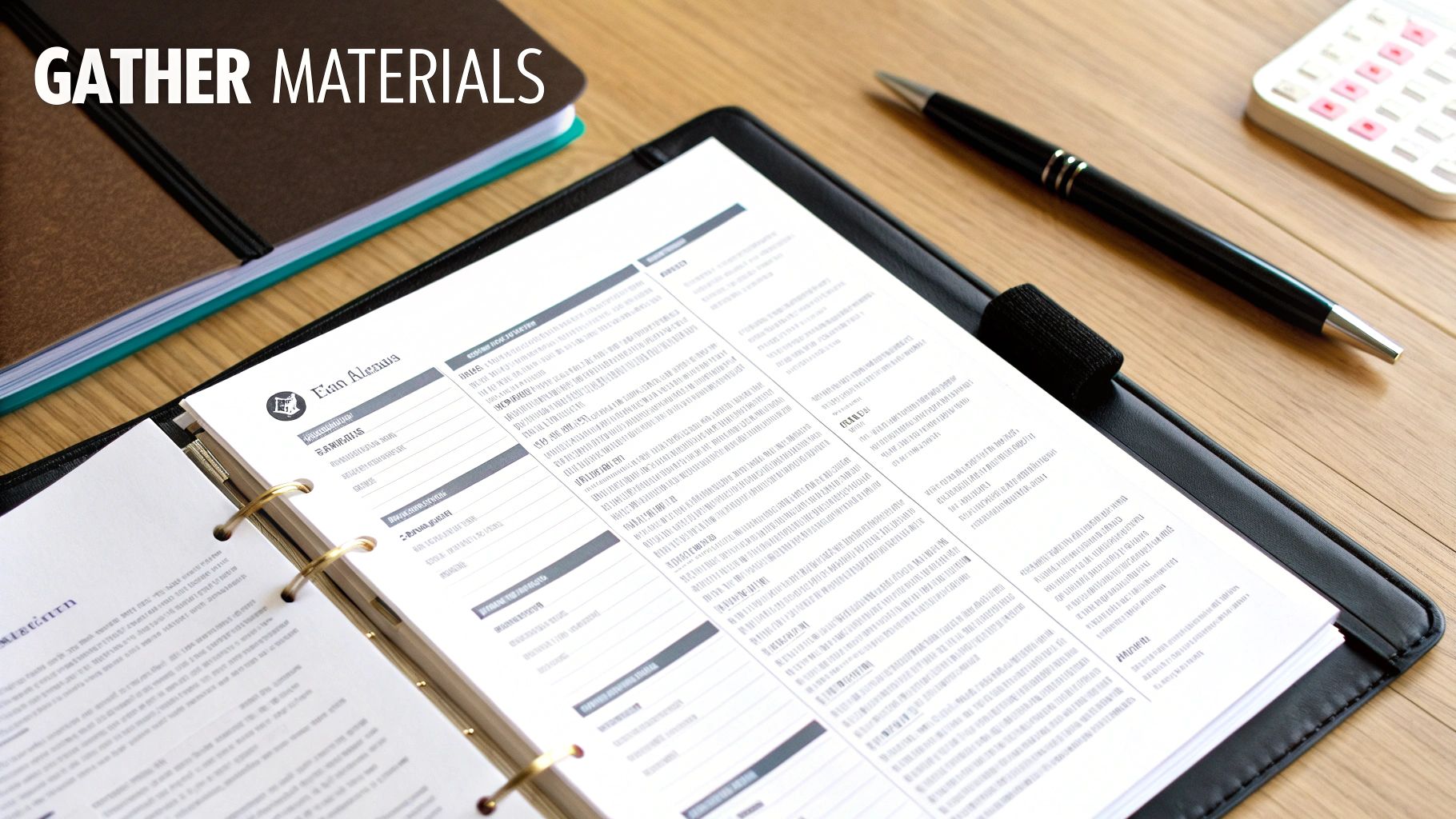
What to Ask For
Think of this as building your toolkit. You need a few key documents to get the full picture of the applicant. Having these on hand lets you weave a consistent story that aligns perfectly with the rest of their application.
Here’s what I always ask for:
- Their updated CV or resume: This gives you a quick, high-level map of their experiences, skills, and accomplishments outside your classroom.
- Their personal statement or application essay: This is gold. It tells you their story in their own words—their motivations, their goals, and the narrative they want the admissions committee to see.
- The program description: Always get a link to the specific program or a copy of the job posting. You need to know what the committee is looking for so you can highlight the most relevant skills and qualities.
- Submission details: Don't forget the practical stuff! Get the firm deadline, the submission method (is it an online portal or an email?), and the exact name and title of the person it should be addressed to.
Getting this information upfront not only saves you a headache later but dramatically improves the quality of your letter. And for students, knowing how to put this packet together is a crucial skill. We have a great guide on requesting a letter of recommendation that can walk them through it.
A great letter writer doesn’t just recall past achievements; they connect those achievements to the candidate's future aspirations. Having the student's personal statement is the key to bridging that gap.
One last tip: I highly recommend a quick, 15-minute chat with the student. I always ask them directly, "What are the two or three key things you'd love for me to highlight about our work together?" This simple question helps you focus on the anecdotes that will best support their application, ensuring your letter complements their story perfectly. It’s a small step that can turn a good letter into a truly outstanding one.
How to Structure Your Letter for Maximum Impact
A great academic reference letter does more than just list a student's good qualities—it tells a story. The right structure helps you build a strong, persuasive case for why they deserve a spot, guiding the reader from your initial connection to your final, enthusiastic endorsement.
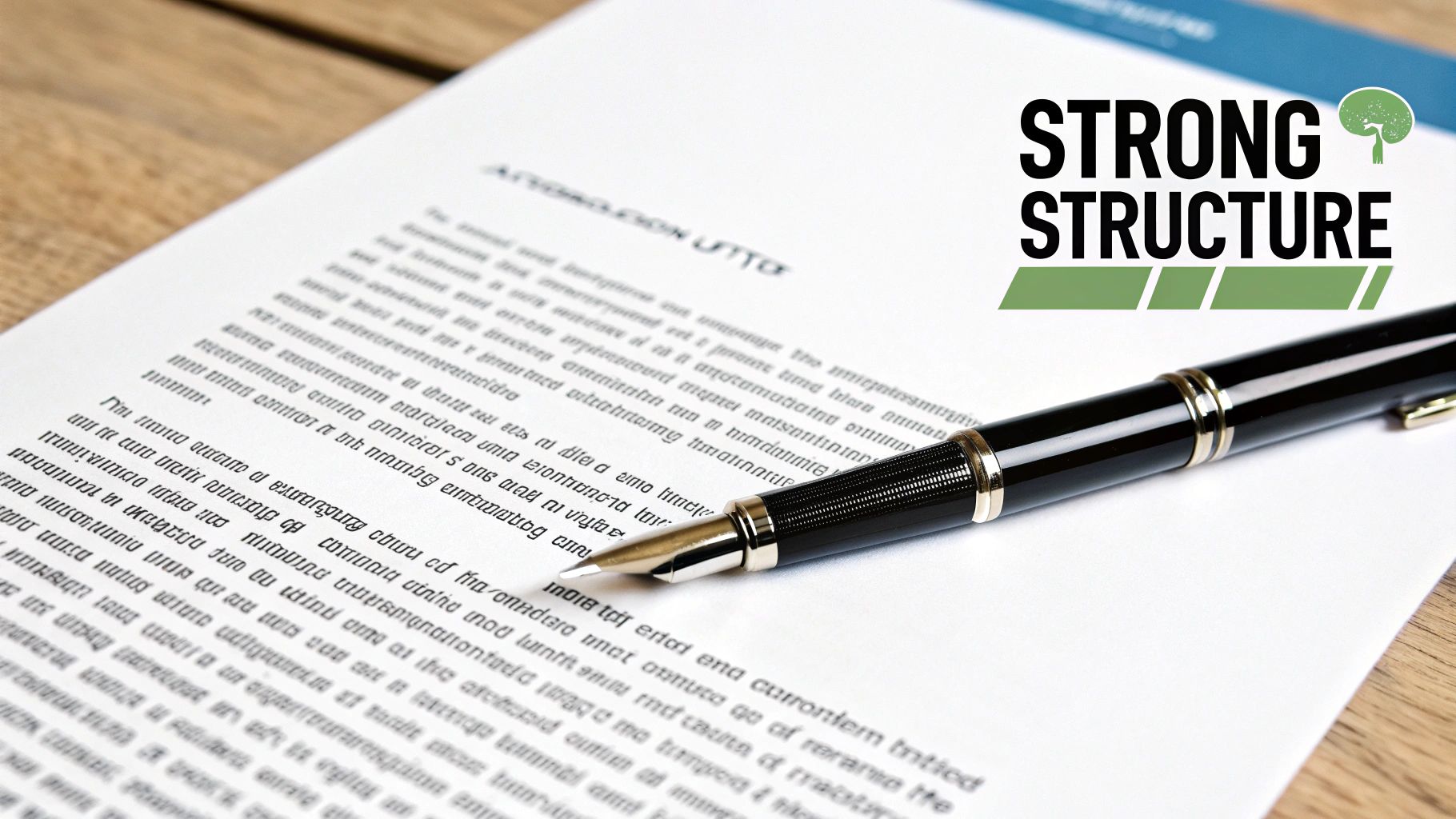
Think of each section as a building block. Get the foundation right, and the rest of the letter will stand strong. If you need a refresher on the basics of layout and presentation, our guide on how to format a letter covers all the essential details.
The Opening: Get Straight to the Point
Your first paragraph needs to be direct and clear. Don't bury the important stuff. Right away, you should cover three things:
- Who you're recommending: State the candidate's full name.
- How you know them: Were you their professor, research advisor, or thesis supervisor? Be specific.
- How long you've known them: Mention the duration and context of your relationship.
This simple opening immediately establishes your credibility and gives the admissions committee the context they need to value your opinion.
The Body: Bring Their Skills to Life with Stories
This is the heart of your letter. Here, you move from just saying someone is great to showing it. Aim for two or three solid paragraphs, with each one focusing on a specific skill or quality.
The key is to use concrete examples. A phrase like "she is a hard worker" is nice, but it's forgettable.
Instead, tell a mini-story. For instance: "During our advanced biostatistics project, Maria single-handedly troubleshot a critical coding error in our lab’s data analysis script. Her initiative not only saved the team weeks of work but also revealed a more efficient methodology we've since adopted."
See the difference? That short anecdote proves she has problem-solving skills, initiative, and technical expertise far better than any simple adjective could. For more inspiration, check out these free sample residency letters of recommendation to see how specific stories make a candidate shine.
The most impactful letters dedicate 70-80% of their content to specific, evidence-backed anecdotes. Vague praise gets forgotten; vivid stories get remembered.
In fact, research shows that detailed, comprehensive letters give applicants a real edge in competitive programs. It's the specific, positive details that make all the difference.
The Closing: End with a Strong Endorsement
Wrap things up with a clear, enthusiastic, and forward-looking conclusion. Briefly summarize the key strengths you've discussed and give your final, unequivocal endorsement.
You want to leave the reader with no doubt about how highly you think of the candidate. A powerful closing line like, "I recommend [Candidate's Name] with my highest enthusiasm," is the perfect way to seal the deal.
Choosing Language That Conveys a Genuine Endorsement
The words you choose are the very heart of your recommendation. They're what transform a standard, run-of-the-mill letter into a powerful story that makes an admissions committee sit up and pay attention. The trick is to strike that perfect balance between sounding professional and being genuinely enthusiastic about the candidate.
Instead of falling back on vague praise like "she's a good student," you need to get specific. Think active, dynamic language.
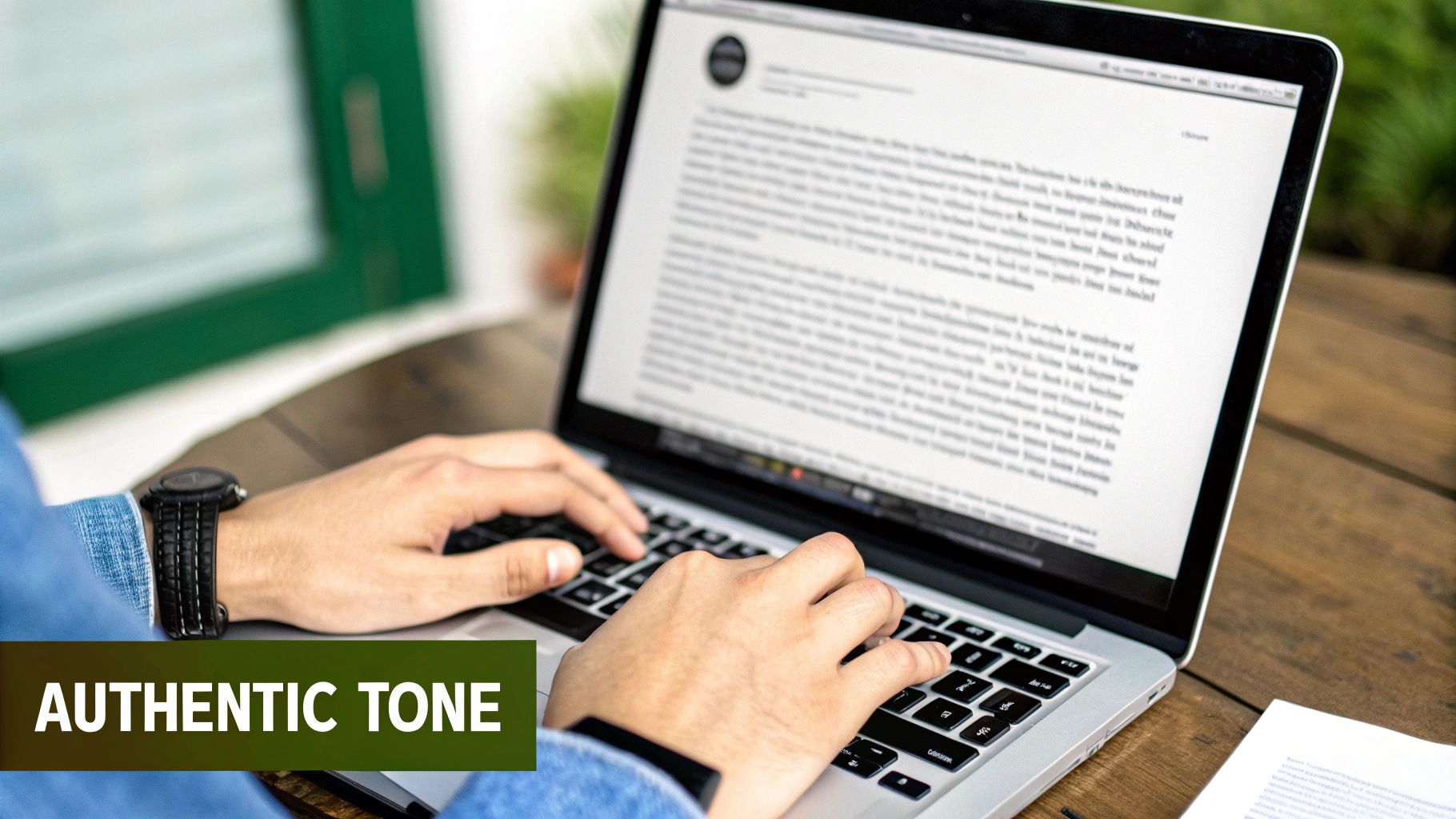
This isn't just about sounding fancy; it's about credibility. Strong verbs and clear, descriptive adjectives give weight to your claims. They paint a vivid picture of what the student can do, all without sounding over-the-top. This starts right from the top, where a well-chosen letter salutation can immediately establish a professional tone.
Mindful Language and Avoiding Bias
We all have unconscious biases, and they can easily creep into our writing. It’s something you have to be actively aware of. Research analyzing over 6,400 recommendation letters found that letters for female and minority candidates often contained weaker language and less forceful endorsements.
So, how do you avoid this? Keep the focus squarely on skills and achievements.
- Highlight Accomplishments: Zero in on what the student actually did. Instead of saying they were "helpful," describe how they "mentored junior students" or "analyzed complex datasets with precision."
- Use Performance-Based Words: Steer clear of adjectives that focus on personality, like "caring" or "sweet." These can carry unintentional gendered connotations. Opt for words that describe their work and impact, like "collaborative," "insightful," or "resourceful."
Making this conscious shift ensures your letter is fair and truly centered on merit.
Your job is to be a champion for the candidate based on what you’ve seen them accomplish. By using specific, action-oriented language, you’re giving them an authentic endorsement that speaks directly to their potential.
Words That Pack a Punch
Want your letter to really pop? Weave in strong, descriptive language. A few simple swaps can make a world of difference.
Here are a few ideas to get you started:
| Instead of This… | Try This… |
|---|---|
| Good | Exceptional, insightful, adept |
| Smart | Analytical, perceptive, quick-thinking |
| Hard-working | Diligent, meticulous, tenacious |
| Led | Pioneered, orchestrated, mobilized |
It’s a subtle change, but choosing words like these turns a simple description into a compelling argument for the candidate. This is how you write a letter that doesn't just get read—it gets remembered.
Getting Your Letter Out the Door
You’ve poured your effort into crafting the perfect letter. Now it’s time to stick the landing. These final steps are what separate a good letter from a great one, ensuring your endorsement makes the impact it deserves.
Before you even think about sending it, give the letter one last, thorough proofread. I always find that reading it out loud is the best trick for catching clunky sentences or typos my eyes just glide over on the screen.
If you have it, always use official letterhead. It’s a small detail, but it instantly adds a layer of professionalism and authority to what you’ve written.
The Art of the Submission
Most universities and programs now funnel you through an online portal, and frankly, some of them can be a pain to navigate. Log in a day or two early just to get the lay of the land and make sure you have everything you need. This can save you from a world of last-minute stress.
The golden rule here is simple: never miss the deadline. A late letter isn't just a minor slip-up; it can cast a shadow on both you and the candidate, and in some cases, might even get their application tossed out.
Now, what if you get a request but don't feel you can write a glowing recommendation? It’s a tough spot, but the most professional thing you can do is politely decline.
A simple, honest response works best. Something like, "I'm honored you asked, but I don't feel I know your work well enough to write the strong letter you deserve," is perfectly acceptable. It protects your integrity and, ultimately, helps the student find someone who can be a better champion for them.
It's also a nice touch to thank them for the consideration, which is good practice in any professional setting, much like what we cover in our guide on writing a business thank you letter.
Common Questions About Writing Reference Letters
Even with the best intentions, you’re bound to run into a few tricky spots when drafting a reference letter. Let's walk through some of the questions I hear most often from colleagues.
One of the biggest anxieties is getting a request from a student you don't know that well. My advice? Be honest. It's perfectly fine to write a letter based on their performance in your 200-person lecture class.
Just be upfront about the context. You can still speak powerfully about their intellectual curiosity based on their questions in class, or their writing skills based on a standout term paper.
How Many Examples Are Enough?
People often wonder if they need to cram every single achievement into the letter. Please don’t. It’s all about quality over quantity.
I always aim for two to three strong, distinct anecdotes. This approach paints a much clearer picture. For example, one story could highlight their sharp analytical skills on a final paper, while another could show how they led a team through a challenging group project. You get to showcase different, valuable traits without burying the reader in details.
Think of your letter as a highlight reel, not a full biography. You're providing compelling evidence for a few key strengths, not just listing everything on their resume.
Handling Different Letter Types
Should you change the letter for different applications? Absolutely. The core of your support for the student won't change, but the focus certainly should.
A letter for a PhD program in history needs to hit different notes than one for a medical school application. The former might focus on research and archival skills, while the latter should emphasize empathy, resilience, and scientific aptitude.
The same logic applies when you're writing for a former student who's now entering the job market. We actually touch on this in our guide to writing a recommendation letter for a coworker, and many of those tips apply here, too.
Ultimately, taking a few extra minutes to tailor your examples to the specific opportunity is what makes a letter truly effective. It signals to the admissions committee that you’ve genuinely considered why this person is a fantastic fit for their program.
Feeling stuck? The AI Letter Generator can help you craft a polished, professional draft in seconds. Get started for free and see how easy it can be. Find out more at https://lettergenerator.co.

